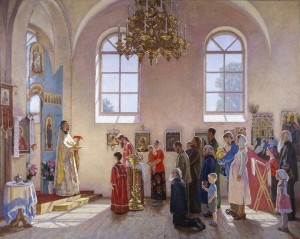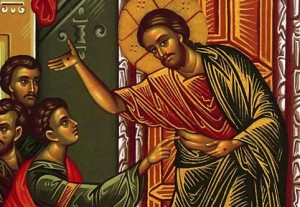 The Second Sunday of Easter presents to us the gospel reading of the Thomas doubting the existence of the risen Lord. The day has many names.
The Second Sunday of Easter presents to us the gospel reading of the Thomas doubting the existence of the risen Lord. The day has many names.
This gospel is proclaimed in the Novus Ordo, the Traditional and Byzantine Liturgies. In the Novus Ordo Liturgy today’s Mass can be referred to as Divine Mercy Sunday. The Latin Mass calls today Low Sunday (after the great solemn feast of Easter), or today is called dominica in albis depositis or “the Sunday in which the white clothes are put away”. Yet another way of referring to today is “Quasimodo Sunday”, because of the first words of the entrance antiphon sung for the Latin Mass which uses the words taken from Peter, Quasi modo geniti infantes, Halleluja, rationabile, sine dolo lac concupiscite (“yearn for the pure spiritual milk as if you were newborn children”).
In all these names, what can we say about this portion of the mystery of the faith in Christian today? If you think about the truth Jesus presented to the Apostles about Himself, it seems that truth is not as convincing as the doubt some put forward as reasonable. I am not quite sure I understand the penchant we have for doubting reasonableness of truth, but doubt exists and I have come to believe that God uses doubt to teach us the meaning of beauty, goodness and truth. Thomas, later revered as a saint and founder of the Church in India, tells us with certitude that the Lord is alive after death on the cross but only after verifying the physicality of the person Jesus when he says, My Lord and my God. He is said by Jesus that he blessed for what he has seen.
 In the Byzantine Liturgy the Troparion of St Thomas is sung: While the tomb was sealed You shone forth from it, O Christ our Life, and while the doors remained closed, You stood among your Disciples, O Resurrection of all, and through them You restored a new spirit in us according to your great Mercy.
In the Byzantine Liturgy the Troparion of St Thomas is sung: While the tomb was sealed You shone forth from it, O Christ our Life, and while the doors remained closed, You stood among your Disciples, O Resurrection of all, and through them You restored a new spirit in us according to your great Mercy.
Today, we are faced with some similar doubts about Jesus, the sacraments and Christian life. Doubt is not new. And, perhaps Saint Thomas did us a favor in recognizing the concrete facts of our faith. Coming to Catholic faith means that we proclaim from whom salvation comes. It means that we are to be missionary so that all people come before the Lord.
One piece of our Catholic life is faith in the Holy Eucharist: faith in the Divine Presence here and now in the sacrament of the Eucharist. Teaching adults about First Holy Communion is difficult –think of the difficulty there is teaching third graders about the Presence of Jesus in Holy Communion. I recall what is called a Eucharistic miracle where a priest doubted the presence of Jesus in the sacred Host and the Lord gave the priest the a sign of Divine Presence by turing the host in heart muscle and the wine into blood.
The English theologian Monsignor Ronald Knox this about the Holy Eucharist: “We have never, as Christians, been truly faithful to Jesus, no matter our denomination. In the end none of us have truly followed those teachings which most characterize Jesus- We have not turned the other cheek. We have not forgiven our enemies. We have not purified our thoughts. We have not seen God in the poor. We have not kept our hearts pure and free from the things of this world. But we have been faithful in one very important way- we have kept the Eucharist going.”